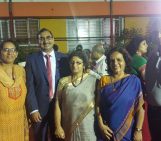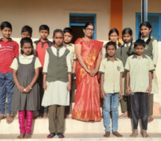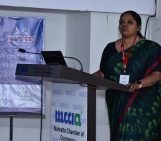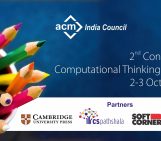-Arati Halbe
The first conference for Computational Thinking in Schools took place in Pune on 20th April 2019.
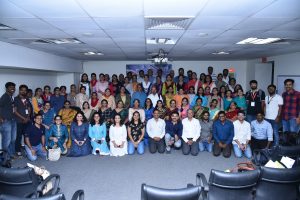
It seems not long ago when I visited Kalmadi Shamrao Primary School to seek feedback on teaching file systems to the primary students. The teacher told me how the children basically liked the units but found it difficult to understand what a ‘filing cabinet’ is! It was the beginning for the content creators as well as the teachers, and we were still trying to explore what worked and what did not. From that point to today, the day of the first conference on Computational Thinking in Schools, the journey has been phenomenal. In three years, starting from a pilot project in 15 private English medium schools in Pune, we have been able to reach out to 3 Lakh students from 750 schools in 11 states of India, with concepts of computational thinking being taught in 5 different languages
Computational thinking is a set of problem-solving methods in which problems and solutions are expressed in a way computers could understand. What this really means is that with computational thinking, we develop the ability to analyse a problem methodically, observing tiny details and deriving a solution, step by step, taking into consideration all possibilities. CSPathshala was formed as a way to formalise imparting these concepts right from the age of primary school. Experts from educational institutes, professionals from the software industry and other enthusiasts volunteered for designing the top level and detailed syllabus and making the powerpoint presentations, lesson plans and worksheets.
The response from schools for the pilot run was very enthusiastic. Different schools used various portions from the curriculum, units and topics recommended and provided by CSpathshala. But we made one common observation across all schools that implemented this: this got the teachers and students involved, thinking about everything in a very systematic and methodical way. Our objective is to reach all children in the entire country, irrespective of language, region and privileges, and boy, the presentations in the conference convinced us that we could! Premalatha Shahji, Kochi could even teach computational skills to specially-abled children.
While the urban schools could teach computational thinking without much difficulty and could also enhance the learning, they could even implement physical computing, the rural schools could bring no less joy to their students, even in the remote regions.
It was very interesting to note how students from a Pune School could make working models of things like a smart dustbin and bus manager. We had seven and eight years old from primary school design routes for their van kakas and plan a visit to various temples while children thinking about even the place needed and time spent for their birthday party guests to keep their footwear!
The teachers from Zilla Parishad School, Takalkarwadi, Khed, Rajgurunagar inspired everyone with their grit and determination when they could teach a couple of units related to computational thinking in their school with severely limited resources and just 269 students. Adivasi students from Nilgiris could enjoy solving sudoku, and coastal schools in Gujarat made a step ahead in applying logical thinking. It was heartwarming to see teachers make the effort to teach “guess my birthdate” and “sudoku” to children from underprivileged families who struggle to even meet both ends meet. Though it does break our heart to witness the far from conducive atmosphere children in India have to study in, it also makes us realise that we are doing something right when we see that we were able to give some joyful moments and useful learning for them. A complete surprise package was Kochi school’s effort to teach computational thinking methods to children with learning disabilities. The teacher’s commitment and passion definitely inspire us to do more.
We hope that the conference serves as a platform for teachers to exchange ideas, share experiences, discuss problems and seek solutions for matters related to teaching computational thinking in schools. We hope that teachers draw inspiration from each other, help each other and form a strong ecosystem to nurture computational thinking. Though implementing at least one module of CSPathshala in their schools was the reason many teachers attended the conference, we hope that the conference soon attracts teachers who experiment with and teach various kinds of original activities related to computational thinking.

